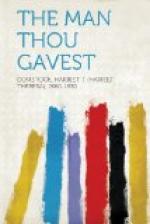Truedale was confounded. Unless he were to disregard his uncle’s wishes, there was no way open for him but to follow—as he was led. Far from being dissatisfied with the distribution of the fortune, he had been relieved to know that he was responsible for only a small part of it; but, on the other hand, should he refuse to cooperate in the schemes outlined by McPherson, he knew that he would be miserably misunderstood.
Confused and ill at ease he sought McPherson later in the day and that genial and warm-hearted man, shrinking always behind so stern an exterior that few comprehended him, greeted him almost affectionately.
“I ordered six months for you, Truedale,” he exclaimed, viewing the result of his prescription keenly, “and you’ve made good in a few weeks. You’re a great advertisement for Pine Cone. And White! Isn’t he God’s own man?”
“I hadn’t thought of him in just that way”—Conning reverted to his last memory of the sheriff—“but he probably showed another side to you. He has a positive reverence for you and I imagine he accepted me as a duty you had laid upon him.”
“Nonsense, boy! his health reports were eulogies—he was your friend.
“But isn’t he a freebooter with all his other charms? His contempt for government, as we poor wretches know it, is sublime; and yet he is the safest man I know. The law, he often told me, was like a lie; useful only to scoundrels—torn-down scoundrels, he called them.
“I tell you it takes a God’s man to run justice in those hills! White’s as simple and direct as a child and as wise as a judge ought to be. I wouldn’t send some folk I know to White, they might blur his vision; but I could trust him to you.”
Silently Truedale contemplated this image of White; then, as McPherson talked on, the dead uncle materialized so differently from the stupid estimate he had formed of him that a sense of shame overpowered him. Lynda had somewhat opened Truedale’s eyes, but Lynda’s love and compassion unconsciously coloured the picture she drew. Here was a hard-headed business man, a man who had been close to William Truedale all his life, proving him now, to his own nephew, as a far-sighted, wise, even patient and merciful friend.
Never had Truedale felt so small and humble. Never had his past indifference and false pride seemed so despicable and egotistical—his return for the silent confidence reposed in him, so pitifully shameful.
He must bear his part now! There was no way but that! If he were ever to regain his own self-respect or hope to hold that of others, he must, to the exclusion of private inclination, rise as far as in him lay to the demands made upon him.




